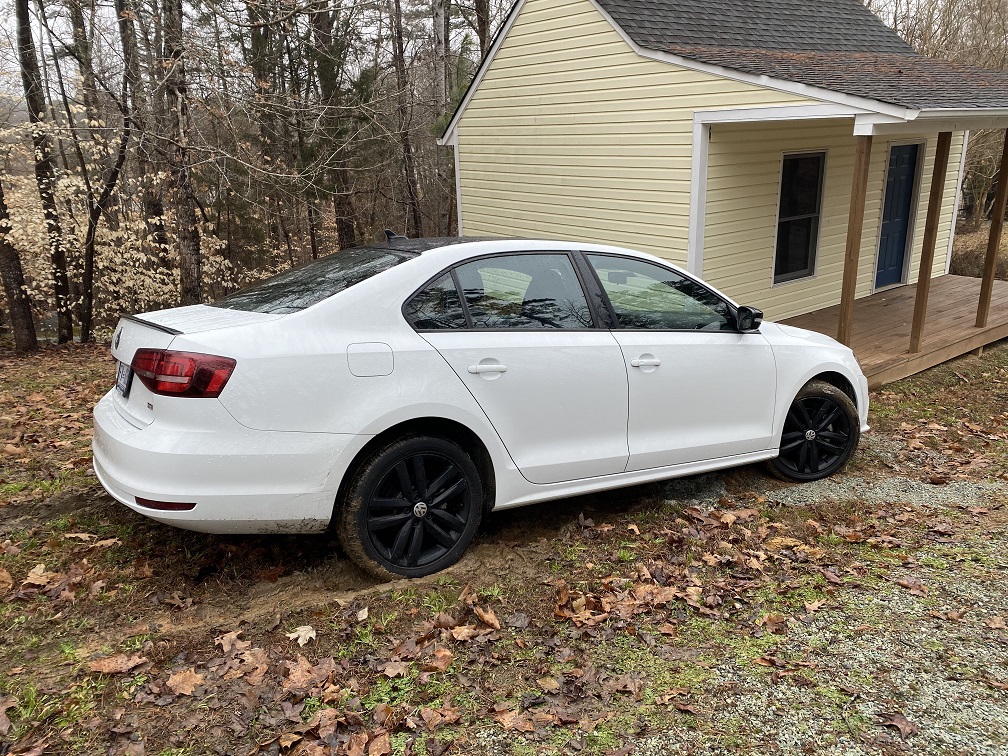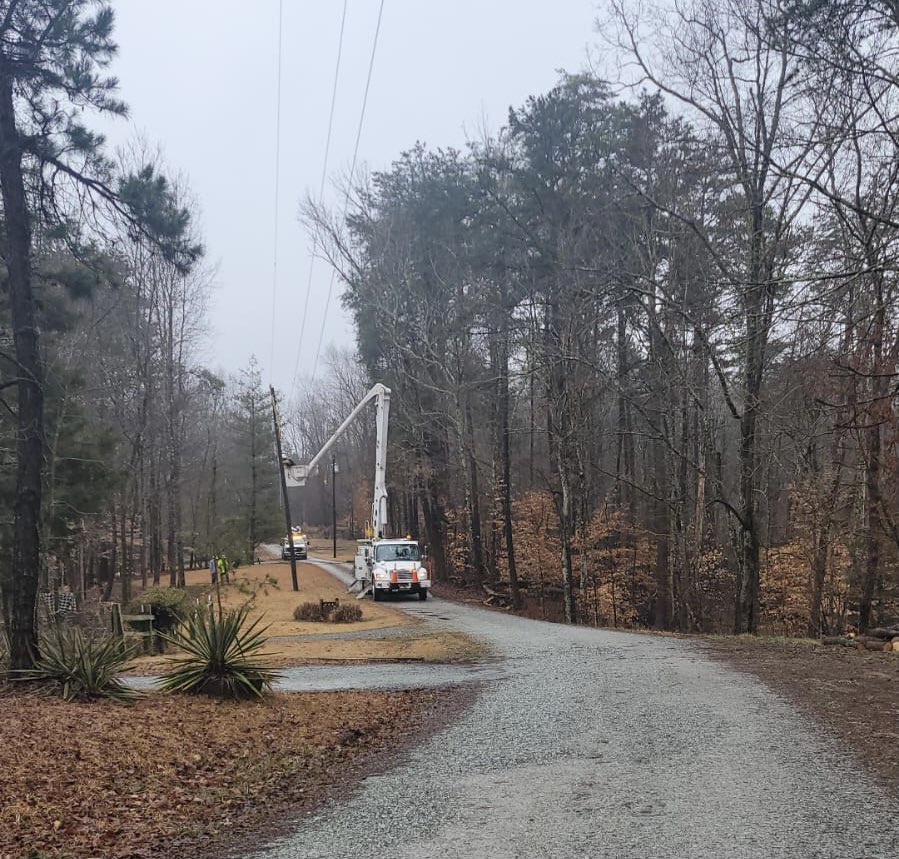
“Stop!” yelled my dad, powerless against forces that had long taken hold. Perhaps it was inevitable that the thick sludge built up over the past day would entrap the tires of our only way out. He didn’t seem to think so and, tired and tireless, arguing began. “Why would you pull the car away from the road and into the pit of mud?” To which my mom responded, “You try reversing in this darkness!”
A fitting end to a day with no end.
Twenty-four hours earlier, my parents and my aunt and I were making our way to a nice rental by the shores of Hyco Lake for a Presidents’ Day weekend getaway from the bustle of Washington, DC and some of the madness of the past 11 months.
Icy, pitch-black, and past midnight; the GPS informed us that our rental hid amidst a dense forest on what looked like a nonexistent road. A left turn to nowhere and no patience in the car for shenanigans after our long trip down was complicated by a storm system that was now raging across the American south — a system soon to dominate national news cycles. In hindsight, a small weather check might’ve done us some good.
After several trips up and down a dark road, the headlights revealed the passage through the trees to our longed-for destination. Soon enough, we sank into our comfortable beds with groceries and luggage unloaded. We made it! Ahead of us lay two days of rest and ease. We couldn’t wait to discover everything Hyco Lake had to offer.

When I closed my eyes, the stresses of the week and junior year and the pandemic and everything else receded to the background. But when I opened them the next morning, something new lay before me; something cold. I didn’t want to remove my covers because I could feel what awaited once I did — shivers, and plenty. I put on a sweater and wondered why it was so cold as I walked over to the bathroom, and got my answer when the light switch failed to work.
My dad passed by and greeted me with some developments: earlier in the morning, he and my mom went out to investigate our cabin’s loss of power and found that the previous night’s ice storm had knocked over a lanky but tall tree, garlanded with split and damaged electrical wires and cables, onto not only the one power line leading in — knocking it out in the process — but also the one road leading out. There was no removing the tree unless one hoped for death by electrocution. I asked how long until power could be restored, and didn’t much like the answer of anywhere between an hour to a few days. My dad left me to do my business, and I realized the severity of our situation when I noticed buckets of lake water on the floor for toilet flushing. It turned out that our rental’s water supply, because it came from a well, needed a pump that in turn needed power. I would soon become familiar with the treks across mud, mulch, and ice to the frigid lake for toilet water that would come to define the day as much as our uncertainty of escape. We had no option but to remain — no power, no water, no heating, and no generator to lend us a hand. How long we would be in this situation was menacingly uncertain.
My mom and aunt sat on the couch, wrapped in blankets. On the coffee table were a few slices of bread and a couple bags of chips. There was no smell of breakfast, only a faint odor of gas. I headed to the kitchen to find most of our food on the countertops, the fridge no longer viable. With a dry bowl of cereal, I joined the shiverers in the living room with no WiFi to distract from the piercing cold softened only by the heat provided by the source of the gas smell: a small heater. And just then, the source of the small heater knocked on our front door.
In came a kind-hearted couple bearing smiles and warmth from a house up the hill who introduced themselves to me as Peter and Chris, locals of Hyco Lake. They came to check on our condition and to bring some extra propane for the heater they left my parents after meeting them on the earlier morning excursion. Their presence was a relief and an undeniable help toward our survival that day. Without these strangers-turned-neighbors of ours, we’d have been sitting in the living room much colder than we were. They generously offered the use of their generator-powered kitchen to us unknowns in the rental down below for later in the day, and left with the promise of helping us in whatever way they could. This and the beautiful view of the wooded lakefront were certain bright spots on a very cloudy day.
After several hours that each felt like days of their own — the only form of entertainment being my mandatory English reading, occasional reignition of the heater, and the wait for news of downed tree removal — the early darkness of winter began looming over with no change to our situation. Having yet to eat a real meal, amidst the food on the kitchen counters, a ready-made chicken alfredo that only required the heat of a powered oven enticed us to take up our neighbors’ offer. Stomachs growling and mouths salivating, we packed the meal and some drinks in a bag heavy enough to warrant us taking the car up the hill.
They welcomed us with open arms and helped us set up in their electrified guest house which offered the respite we sorely needed from the harsh conditions of the day. Even the temporary access to the Internet was greatly overshadowed by the warmth and warm meal. We charged our phones as much as we could and ate without a word being spoken at the table, though there was an unspoken disbelief about our Presidents’ Day weekend experience thus far.

We were soon recharged, and went, guided by our phones’ flashlights, to check on the downed tree — our barrier from the rest of the world — one last time. The ground sank with each step, the cold made me regret leaving my gloves at home, and the road felt endless, engulfed by the great black sheath of night. Suddenly, out of the darkness, a sight worse than Bigfoot: the barrier remained. A night with many jackets, sweaters, and layers it was. And though I was not happy, the sight of our neighbors reminded us that if the worst came to pass, we’d have support, a source of great comfort under the circumstances. As we said goodbye to our hosts, my mom got in the car to bring it out front.
“Stop!” yelled my dad.
A fitting end to a day with no end.
I could do nothing but laugh. The car was absolutely stuck, and there was no moving or pushing it, and it was late, too late to try to do anything about it. Into the mud my mom drove the vehicle we were counting on once the road was reopened. But our despair was short lived when, to add to the mounting acts of generosity, Peter said he would use his pickup truck to try getting it unstuck in the morning. We could even have breakfast together, he said. At this moment, my family could care less about the ice, the lack of power, lack of WiFi, and lack of heat. The pure kindness and charity we had experienced this day from complete strangers had likely saved us from the worst. In a time like this, after a year like 2020, this was a welcome break from the bleakness and pessimism surrounding our daily lives.
It was still cold the next morning. The pickup truck couldn’t un-stuck the car, and there was no sign of the power company, which definitely had its hands full as we learned how extensive the ice storm’s damage had been. We were ready to bail and cut the weekend short by a day. My mom called my uncle from DC to come and pick us up from the other side of the barrier, a full four-hour journey for my uncle. Right after he agreed, my mom decided to check one last time with the power company. Just then, we heard the sound of a truck rolling in. A collective deep breath and round of applause welcomed the cavalry.
My uncle ended up not coming down. Now with a way out and power restored, we chose to spend the last night as intended — WiFi, water, heat and all. The sky was still grey, but we were anything but. We were ecstatic as we spent a night unwinding and relaxing, appreciating the small comforts that we had, prior to the trip, taken so much for granted.

I will always look back fondly at the time I spent at Hyco Lake. It wasn’t a vacation, but a rewarding and memorable experience nonetheless, more than any other weekend may have been. Plus, as we left the following morning, we had a feeling this wouldn’t be our last time here, or our last time seeing our neighbors-turned-friends up the hill. On the brink of true danger like too many in that same storm were facing, they were there to ensure we held steady. We will always be grateful to our neighbors Peter and Chris, who taught us, on Hyco Lake, the true meaning of neighborliness.
That morning we exchanged our goodbyes, and I left with a business card. In bold serif, it read: “Hyco Lake Magazine.”
J. P. Tampe is a high school senior with aspirations of becoming a writer, currently attending St. Anselm’s Abbey School in Washington, DC where he serves as student body president and co-runs the film club. As fate would have it, an ice storm conjured a unique opportunity to have a first story published. He looks forward to visiting the Hyco Lake region again soon.
